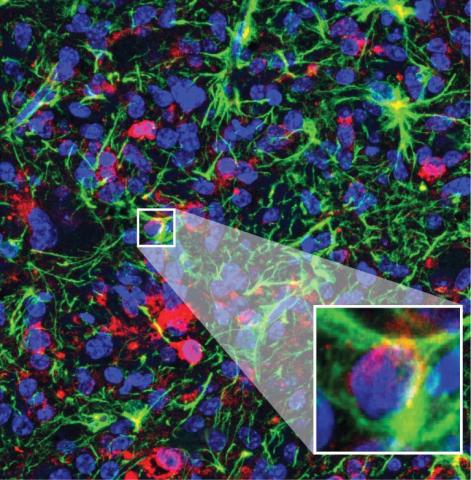Reactions: some progesterone analogues increase risk of developing a type of brain tumour, study finds
A French study involving more than 100,000 women has found a link between long-term use of some progesterone hormone analogues - used for contraception or hormone replacement therapy - and an increased risk of developing meningioma, a generally benign type of brain tumour. The results are published in The BMJ.
Paul - Progesterona (EN)
Paul Pharoah
Professor of Cancer Epidemiology, Department of Computational Biomedicine, Cedars-Sinai Medical Center
This paper reports on a carefully conducted study using records from the French National health Data System to study the association of progestogen medications and risk of meningioma. An association of high doses of certain types of progestogens with meningioma has previously been reported, but these are rarely used in clinical practice. The aim of this study was to investigate more commonly used progestogens.
The press release is a good summary of the findings. The authors note that causality cannot be determined in an observational study such as this but, given what we know about the risk factors for meningioma, it seems quite likely that the association reported for medroxyprogesterone acetate is causal. In particular, the size of the effect is quite large, there are no obvious confounders or biases, and the effect was seen for some medications and not others (any confounding and bias would be expected to affect all medications similarly).
It is important to note that progestogens are an important component of many types of birth control pill (oral contraceptives) and hormone replacement therapy but there are many different types of progestogens and no association with meningioma was found for the types of progestogens commonly used in the United Kingdom. This means that women taking the commonly used birth control pills or hormone replacement therapy are not at increased risk of meningioma. It is important that women do not stop using their birth control pills without consulting their doctor.
The notable exception is medroxyprogesterone acetate (also known as Depo Provera) which is sometimes used as an injectable form of contraception in the UK. Use of medroxyprogesterone acetate for more than one year was associated with a five-fold increase in risk of meningioma. While this sounds like a very large risk it is important to realise that meningioma is rare and a five-fold increase in a rare disease is still a rare disease. To put some numbers on this, based on UK cancer registration data, approximately 40 out of 10,000 30-year old women would be expected to be diagnosed with a meningioma before the age of 80. This increases to 200 in those who have used medroxyprogesterone acetate. This small increase in risk needs to be considered in relation to the benefits of using an injectable form of contraception.
Noble - Progesterona (EN)
Karen Noble
Director of Research, Policy and Innovation at Brain Tumour Research (UK)
Any increased understanding of the risk factors of brain tumours is beneficial to the brain tumour community; it may open doors to research on preventative measures, as well as increase our understanding of why these tumours arise in the first place. However, the public needs to be cautious when digesting the results from a study such as this before taking action. Although this study has linked certain progestogen treatments to an increased risk of meningioma, it has also demonstrated the safety of other progestogen treatments which were shown to not increase risk. If you are concerned, it is recommended that you speak to your GP before stopping any prescribed treatment.
Evans - Progesterona (EN)
Susan Evans
Gynaecologist with expertise in pelvic pain and associate professor at the University of Adelaide (Australia)
Progestogen medications are medications that mimic progesterone in the body. Each progestogen has its own characteristics. This is important information to guide health practitioners when prescribing hormonal therapies. Importantly, the use of intrauterine devices, including Mirena, were not found to increase meningioma risk.
This information will further speed the changing preference from oral hormonal medications to intrauterine devices.
The Kaiser Family Foundation in the United States found that IUD use increased from 2% - 14% of contraceptive use, while oral contraceptive use fell from 31% to 22% over the time period 1995-2017. This data will further speed this change.
The authors of the paper have reported on an epidemiological study of 108,000 women. This included 18,000 women with intracranial meningioma.
It is therefore a large sample size, well able to consider outcomes of low frequency. They have not put forward a reason for their findings.
We know that different progestogen medications react differently at multiple hormonal receptors in the body. We also know that some progestogens, including medroxyprogesterone acetate and cyproterone acetate disrupt the androgen receptor.
This study should be a prompt for research considering different progestogens and their interaction with a full range of hormonal and endocrine receptors including androgen receptors.
"I am founder and shareholder of Alyra Biotech, which is developing a novel intrauterine device to reduce pelvic pain in women through modulation of the immune system. I am a very minor shareholder in Havah Therapeutics which is developing a therapy to reduce breast cancer using androgens and aromatase inhibitors to reduce breast density. I have also published on the evolutionary aspect of androgen disruption in the development of endometriosis - and on the association between low androgens and pain symptoms in women".
Roland et al.
- Research article
- Peer reviewed
- Non-randomized
- Observational study
- People



